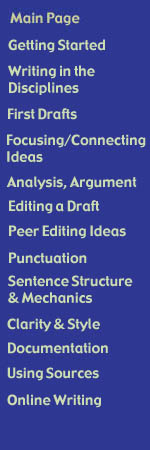

Using Paraphrases
(printable version here)
Paraphrases restate another person's ideas using your own words and your own sentence structures. Like direct quotations, they must be credited to their sources; to fail to do so constitutes plagiarism. Remember, just restating another's original idea using different words does not make it your own!
If something you read in a text is general knowledge, or could be gained from a number of sources, the idea is not "original" to your author. The following example presents such a fact:
Source 1: "By late 1941, the Royal Air Force had effectively stopped the German daylight bombardment of England. Except for Hitler's V-1 and V-2 attacks in 1944 and 45, England escaped further sustained air attacks during daylight hours."
CAUTION: When you paraphrase material, put it in your own words and use your own sentence structure. Don't allow the wording to resemble the original, even if you cite the source. Otherwise, you're plagiarizing the author's words without letting the reader know that the words aren't your own.
The next quotation reveals an original opinion by the author:
Source 2: "During the Battle of Britain, Hitler made a serious mistake in allowing his commanders to switch the emphasis of air attacks from the British airfields to British population centers. Fortunately for England and the rest of the world, Hitler's decision allowed the RAF to regroup and destroy more and more attacking German bombers" (Doe 100).
In the paraphrase that follows, note that the first sentence recaps a general fact, whereas the second and third restate Doe's opinion (using MLA format). Note the substantial rewording of sources:
Paraphrase: Although Hitler's buzz bombs and rockets fell on England late in the war, Germany's daylight air offensive against the island effectively ended by 1941. Historians such as John Doe contend that the battle's turning point came when German bombers shifted their attacks from military to civilian targets (100). This change in tactics proved a serious mistake for Nazi Germany, since the Royal Air Force, initially hard hit, gained enough breathing space to launch an effective counterattack (Doe 100).
Back to 'Using Sources'
Writer's Web | Writing Center | Make
an Appointment | Library
Copyright Info